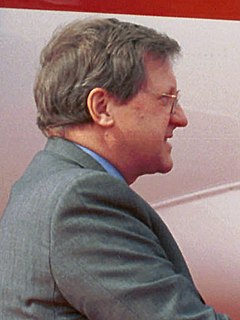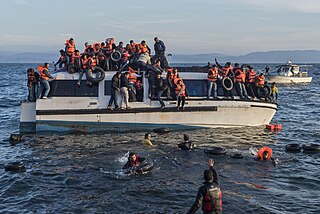
The International Organization for Migration (IOM) is a United Nations agency that provides services and advice concerning migration to governments and migrants, including internally displaced persons, refugees, and migrant workers.

A refugee, generally speaking, is a displaced person who has crossed national boundaries and who cannot or is unwilling to return home due to well-founded fear of persecution. Such a person may be called an asylum seeker until granted refugee status by the contracting state or the United Nations High Commissioner for Refugees (UNHCR) if they formally make a claim for asylum. The lead international agency coordinating refugee protection is the United Nations Office of the UNHCR. The United Nations has a second office for refugees, the United Nations Relief and Works Agency (UNRWA), which is solely responsible for supporting the large majority of Palestinian refugees.

Emigration is the act of leaving a resident country or place of residence with the intent to settle elsewhere. Conversely, immigration describes the movement of people into one country from another. A migrant emigrates from their old country, and immigrates to their new country. Thus, both emigration and immigration describe migration, but from different countries' perspectives.

The United Nations System consists of the United Nations' six principal organs, the Specialized Agencies and related organizations. The UN System includes subsidiary bodies such as the separately administered funds and programmes, research and training institutes, and other subsidiary entities. Some of these organizations predate the founding of the United Nations in 1945 and were inherited after the dissolution of the League of Nations.

Lloyd Norman Axworthy is a Canadian politician, elder statesman and academic. He served as Minister of Foreign Affairs in the Cabinet chaired by Prime Minister Jean Chrétien. Following his retirement from parliament, he served as president and vice-chancellor of the University of Winnipeg from 2004 to 2014 and as chancellor of St. Paul's University College. He is currently the Chair of the World Refugee & Migration Council.

Forced displacement is an involuntary or coerced movement of a person or people away from their home or home region. The UNHCR defines 'forced displacement' as follows: displaced "as a result of persecution, conflict, generalized violence or human rights violations".

Environmental migrants are people who are forced to leave their home region due to sudden or long-term changes to their local or regional environment. These changes compromise their well-being or livelihood, and include increased drought, desertification, sea level rise, and disruption of seasonal weather patterns. The degree to which some of these changes occur can be reduced by means of climate adaptation projects. Climate refugees may flee or migrate to another country, or they may migrate internally within their own country.[2] Though there is no uniform, clear-cut definition of environmental migration, the idea is gaining attention as policy-makers and environmental and social scientists attempt to conceptualize the potential social effects of climate change and environmental degradation.

Immigration is the international movement of people to a destination country of which they are not natives or where they do not possess citizenship in order to settle as permanent residents or naturalized citizens. Commuters, tourists, and other short-term stays in a destination country do not fall under the definition of immigration or migration; seasonal labour immigration is sometimes included, however.
James Hathaway is an American-Canadian scholar of international refugee law and related aspects of human rights and public international law. His work is regularly cited by the most senior courts of the common law world, and has played a pivotal role in the evolution of refugee studies scholarship. Hathaway pioneered the understanding of refugee status as surrogate or substitute protection of human rights, authored the world's first comprehensive analysis of the human rights of refugees, merging doctrinal study of refugee and human rights law with empirical analysis of the state of refugee protection around the world and directed a multidisciplinary and global team of scholars and officials in an initiative to reconceive the structures of refugee protection more fairly to share burdens and responsibilities.

The Graduate Institute of International and Development Studies, or the Graduate Institute, abbreviated IHEID, is a government-accredited postgraduate institution of higher education located in Geneva, Switzerland.
The Refugee Studies Centre (RSC) was established in 1982, as part of the University of Oxford's Department of International Development, in order to promote the understanding of the causes and consequences of forced migration and to improve the lives of some of the world's most marginalised people. Its philosophy is to "combine world-class academic research with a commitment to improving the lives and situations for some of the world's most disadvantaged people".

Howard Adelman is a Canadian philosopher and former university professor. He retired as Professor Emeritus of Philosophy at York University in 2003. Adelman was one of the founders of Rochdale College, as well as the founder and director of York's Centre for Refugee Studies. He was editor of Refuge for ten years, and since his retirement he has received several honorary university and governmental appointments in Canada and abroad. Adelman was the recipient of numerous awards and grants, and presented the inaugural lecture in a series named in his honor at York University in 2008.
The International Institute of Humanitarian Law (IIHL) is an independent, “non-profit, humanitarian association having social values as its objectives”, founded in 1970 in Sanremo, Italy. Its headquarters are situated in Villa Ormond, while a liaison office of the Institute is established in Geneva, Switzerland.

The Oxford Department of International Development (ODID), or Queen Elizabeth House (QEH), is a department of the University of Oxford in England, and a unit of the University’s Social Sciences Division. It is the focal point at Oxford for multidisciplinary research and postgraduate teaching on the developing world.
Migration studies is the academic study of human migration. Migration studies is an interdisciplinary field which draws on anthropology, prehistory, history, economics, law, sociology and postcolonial studies.

Alexander Milton Stedman Betts is the Leopold Muller Professor of Forced Migration and International Affairs, William Golding Senior Fellow in Politics at Brasenose College, and Associate Head of the Social Sciences Division at the University of Oxford. He was formerly director of the Refugee Studies Centre between 2014 and 2017.
Dawn Chatty, is an American Emerita Professor of Anthropology and Forced Migration, who specialises in the Middle East, nomadic pastoral tribes, and refugees. From 2010 to 2015, she was Professor of Anthropology and Forced Migration at the University of Oxford and from 2011 to 2014, Director of the Refugee Studies Centre.
Albanian New Zealanders are residents of New Zealand who are of Albanian heritage or descent, often from Kosovo, with smaller numbers from Albania and a few from North Macedonia. Albanian New Zealanders are mainly concentrated in the city of Auckland. The Albanian community has been present in New Zealand since the mid twentieth century and are an integrated part of its society.
Susan Lee McGrath is a Professor Emerita in the School of Social Work at York University and former director of York's Centre for Refugee Studies.
Oxford Monitor of Forced Migration (OxMo) is a biannual publication engaging in a global intellectual dialogue about forced migration, supported by the Refugee Studies Centre at the University of Oxford.











